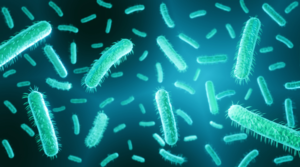 Scientist have long known that bacteria in the intestines, also known as the microbiome or microbiota, perform a variety of useful functions for their hosts, such as breaking down dietary fiber in the digestive process and making vitamins K and B7.1 The gut microbiota also, influences many aspects of human make-up, from metabolism, to the cardiovascular system and the immune system.
Scientist have long known that bacteria in the intestines, also known as the microbiome or microbiota, perform a variety of useful functions for their hosts, such as breaking down dietary fiber in the digestive process and making vitamins K and B7.1 The gut microbiota also, influences many aspects of human make-up, from metabolism, to the cardiovascular system and the immune system.
The immune system is a group of cells and molecules that protect us from disease by monitoring our body by responding to any foreign (non-self) substances they perceive as threats, particularly infectious microbes. Our immune system has co-evolved along with a diverse gut flora, intestinal bacteria or microorganisms, not only to create defenses against pathogens, but also to develop tolerance for beneficial microbes.
The immune system and the gut have a mutually beneficial relationship that promotes the growth of beneficial microbes; however, when that relationship is disrupted it can cause an immune response like inflammation. Inflammation is a defense reaction of the body against disease. Diseases like Cron’s disease, Fibromyalgia, rheumatoid arthritis are diseases that can result in chronic inflammation.
With chronic diseases there is no cure, however, there are ways we can manage them naturally. Eating foods that are considered anti-inflammatory or following an anti-inflammatory diet can reduce inflammation, thus decreasing pain. Foods like tomatoes, green leafy vegetables (kale and spinach), help reduce inflammation produce antioxidants. Antioxidants work by reducing levels of free radicals. These reactive molecules are created as a natural part of your metabolism but can lead to inflammation when they’re not held in check.3
It is often suggested to people with chronic conditions that sticking to an anti-inflammatory diet, but what does that mean when we are shopping for or preparing food? In an upcoming blog, we will ask a clinical nutritionist to give us some guidance on what an anti-inflammatory diet is and how to plan meals on such a diet.
References
- Brown University. “Gut microbiome regulates the intestinal immune system.” ScienceDaily. ScienceDaily, 18 December 2018. <www.sciencedaily.com/releases/2018/12/181218123123.htm>.Brown University. (2018, December 18). Gut microbiome regulates the intestinal immune system. ScienceDaily. Retrieved February 27, 2020 from sciencedaily.com/releases/2018/12/181218123123.htm.
- Adaes, S. How the Gut Microbiota Influences Our Immune System. NeuroCracker Collective. Website. https://neurohacker.com/how-the-gut-microbiota-influences-our-immune-system. Published July 18, 2019. Retrieved February 27, 2020.
- Anti-inflammatory Diet 101: How to reduce Inflammation Naturally. Healthline. Website. https://www.healthline.com/nutrition/anti-inflammatory-diet-101. Accessed February 27, 2020.
